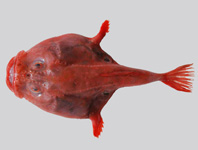Abstract
We describe a new species of Rhadinella from the Sierra Madre del Sur of Guerrero, Mexico, a region where the genus was previously unknown. This diminutive species is a member of a group of snakes previously allocated in the Rhadinaea godmani group, and more recently transferred to the genus Rhadinella. These snakes may have conspicuous dark longitudinal striping on a pale brown to orange background or may have dark brown to blackish dorsal ground coloration, which mostly or completely obfuscates a pattern of longitudinal striping. The new species is mostly dark with barely discernible slightly paler or darker striping (depending on how striping is interpreted). The closest relative of the new species, on the basis of morphological similarities and biogeography, appears to be Rhadinella donaji which occurs to the east in the Sierra Madre del Sur of Oaxaca about 275 km from the type-locality of the new species.
References
Beaupre, S.J. (Ed.) (2004) Guidelines for use of live amphibians and reptiles in field and laboratory research. 2nd Edition. American Society of Ichthyologists and Herpetologists, 43 pp. Available from: http://www.asih.org/sites/default/files/documents/resources/guidelinesherpsresearch2004.pdf (accessed 9 March 2016)
Campbell, J.A. (2015) A new species of Rhadinella (Serpentes: Colubridae) from the Pacific versant of Oaxaca, Mexico. Zootaxa, 3918 (3), 397–405.
http://dx.doi.org/10.11646/zootaxa.3918.3.3
Davis, W.B. & Dixon, J.R. (1959) Snakes of the Chilpancingo region, Mexico. Proceedings of the Biological Society of Washington, 72, 79–92.
Davis, W.B. & Dixon, J.R. (1961) Reptiles (exclusive of snakes) from the Chilpancingo region, Mexico. Proceedings of the Biological Society of Washington, 74, 37–56.
Davis, W.B. & Dixon, J.R. (1965) Amphibians of the Chilpancingo region, México. Herpetologica, 20, 225–233.
Hall, C.W. (1951) Notes on a small herpetological collection from Guerrero. Kansas University Science Bulletin, 34, 201–212.
Hynková, I, Starostová, Z. & Frynta, D. (2009) Mitochondrial DNA variation reveals recent evolutionary history of main Boa constrictor clades. Zoological Science, 26, 623–631.
http:/dx.doi.org/10.2108/zsj.26.623Leopold, A.S. (1950) Vegetation zones of Mexico. Ecology, 31, 507–518.
http://dx.doi.org/10.2307/1931569Myers, C.W. (1974) The systematics of Rhadinaea (Colubridae), a genus of New World snakes. Bulletin of the American Museum of Natural History, 133, 1–262.
Myers, C.W. (2011) A new genus and new tribe for Enicognathus melanauchen Jan 1863, a neglected South American snake (Colubridae: Xenodontidae), with taxonomic notes on some Dipsadinae. American Museum Novitates, 3715, 1–33.
http://dx.doi.org/10.1206/3715.2Pérez-Ramos, E., Saldaña de la Riva, L. & Uribe-Peña, Z. (2000) A checklist of the reptiles and amphibians of Guerrero, México. Anales del Instituto de Biología, Universidad Nacional Autónoma de México, Serie Zoología, 71, 21–40.
Smith, H.M. (1941) A new genus of Mexican snakes related to Rhadinaea. Copeia, 1941, 7–10.
http://dx.doi.org/10.2307/1437694

